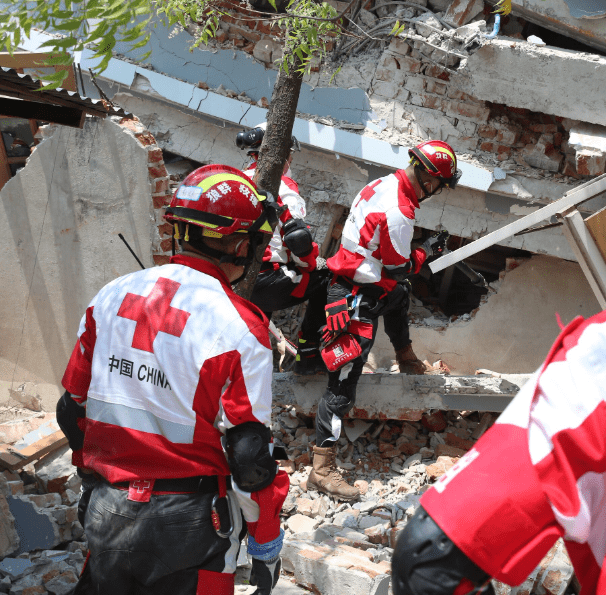In a deeply troubling development amid Myanmar’s worst earthquake in over a century, the country’s military junta admitted to firing upon a Chinese Red Cross aid convoy.
The incident occurred as the junta’s top leader, Min Aung Hlaing, rejected pleas from rebel groups for a temporary ceasefire to support humanitarian relief efforts.
A convoy organised by the Chinese Red Cross came under gunfire while delivering emergency aid to victims of the catastrophic earthquake that recently struck central Myanmar.
The junta’s spokesperson, Zaw Min Tun, confirmed that “warning shots” were fired, claiming the convoy had entered a conflict zone in Mandalay’s Naung Cho township and failed to comply with instructions to stop.
According to the Ta’ang National Liberation Army (TNLA), the attack took place at approximately 9:21pm local time in Ummati village.
Military forces allegedly used machine guns, forcing the convoy to temporarily retreat. Members of the rebel group shielded the convoy in an attempt to allow the humanitarian supplies to continue toward affected communities.
China Responds to Shooting Incident
Following the attack, China’s foreign ministry confirmed that neither personnel nor supplies were harmed and expressed hope that “all factions and parties in Myanmar will prioritise earthquake relief efforts.”
China has maintained a cooperative relationship with Myanmar’s military regime despite ongoing civil unrest since the 2021 coup.
The 7.7-magnitude earthquake that hit Myanmar has had far-reaching consequences, not just within its borders but across Southeast Asia. In central Myanmar, thousands have been killed or injured, with hundreds more missing.
Meanwhile, in neighbouring Thailand, tremors from the quake were linked to the deadly collapse of a high-rise building in Bangkok.
For a comprehensive report on the seismic activity, casualties, and international response efforts in both Myanmar and Thailand, read our detailed coverage here: Myanmar Earthquake 2025: Massive Tremors Rock Mandalay and Bangkok.
Junta Dismisses Ceasefire as Rebels Offer Pause
General Min Aung Hlaing, the leader of the ruling junta, rejected proposals from armed ethnic groups to pause hostilities and focus on rescue operations. Speaking at a fundraising event in Naypyidaw, he accused rebel forces of preparing for future attacks despite their declared ceasefire.
“Some ethnic armed groups may not be actively engaging in battles right now, but they are gathering and training in preparation for attacks… Tatmadaw will continue to take necessary security measures,” he said.
Although the junta leader insisted that no targeted offensives were being carried out, he did admit that military forces had responded to rebel activities—effectively acknowledging continued military engagement amid the relief crisis.
Rebel Groups Push for Humanitarian Access
In contrast, several armed opposition groups and the pro-democracy National Unity Government (NUG) declared a two-week suspension of operations to allow unimpeded humanitarian access. These include:
- Arakan Army (AA)
- Myanmar National Democratic Alliance Army (MNDAA)
- Ta’ang National Liberation Army (TNLA)
- National Unity Government (NUG) – formed by lawmakers ousted in the 2021 coup
Despite these declarations, the military junta was accused of bombing rebel-held areas within hours of the earthquake, drawing condemnation from the United Nations and international human rights organisations.
Amnesty International criticised the junta’s actions, stating they were adding “to the strain of recovery efforts and the fear and anxiety of survivors.”
UN Special Envoy on Myanmar, Julie Bishop, said the tragedy had highlighted the broader vulnerabilities within the country: “The earthquake has laid bare the deeper vulnerabilities facing Myanmar’s people and underscored the need for sustained international attention to the broader crisis. All sides must urgently allow space for humanitarian relief and ensure that aid workers can operate in safety.”
The 7.7-magnitude earthquake wreaked havoc across central Myanmar, killing at least 2,700 people and injuring over 4,500. Hundreds remain missing. Rescue efforts have been intensified with the support of international aid groups from China, India, Russia, Singapore, and Malaysia.
| Country | Assistance Provided |
|---|---|
| China | $14 million in aid, rescue personnel |
| India | Search and rescue units |
| Russia | Emergency aid shipments |
| Singapore | Medical and logistics teams |
| Malaysia | Humanitarian personnel and relief goods |
The Junta vs The Military: Understanding the Power Structure
It is essential to distinguish between Myanmar’s military (Tatmadaw) and the military junta, officially known as the State Administration Council. While the Tatmadaw is the country’s standing armed forces, the junta refers to the governing authority established after the 2021 military coup.
The junta, led by Min Aung Hlaing, continues to suppress dissent and control state mechanisms, even as it loses territorial control. As of 2025, estimates suggest that the junta governs less than 30 per cent of the country, primarily major cities, while vast rural regions remain contested by ethnic armed groups and resistance forces.
Tragedy in Bangkok Tied to Earthquake Tremors
In neighbouring Thailand, aftershocks from the Myanmar quake are believed to have contributed to the collapse of a 33-storey under-construction skyscraper in Bangkok, resulting in at least 21 fatalities.
The building, part of a joint venture between Italian-Thai Development Pcl and China Railway Number 10 Thailand Co., has come under scrutiny. Early investigations revealed that inferior-quality steel bars, produced by a previously shut-down manufacturer, were used in the construction.
These bars failed stress, chemical, and mass composition tests as reported by the Iron and Steel Institute of Thailand. Authorities are conducting a separate investigation to determine the primary cause of the structural failure.
Myanmar faces a dire humanitarian and political crisis as natural disaster collides with ongoing conflict. While rebel groups signal a willingness to prioritise relief efforts, the junta’s refusal to embrace a ceasefire threatens to hinder recovery and deepen suffering across the nation.
With international aid pouring in and pressure mounting on all factions, the immediate priority remains clear: ensuring aid can reach those who need it most—without fear of being caught in the crossfire.






